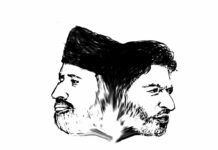Zamir Ahmad
Nassim Nicholas Taleb is distinguished Professor of Risk Engineering in New York University’s School of Engineering. Known globally for predicting the economic and banking crisis of 2008, Taleb is an author of a four volume philosophical essay on uncertainty, titled the Incerto which covers the following books: Antifragile, The Black Swan, Fooled by Randomness and The Bed of Procrustes. Amongst these, The Black Swan, a book about unpredictable events, sold more than 3 million copies and was translated in to 31 languages. It was infact this book that predicted the global economic crisis of 2008. In a review by the Sunday Times, The Black Swan was described as one of the twelve most influential books since World War II.
Taleb was recently in India to attend the “Economic Times Global Economic Summit” organized and hosted by a leading business daily, The Economic Times. Key business leaders and economists from across the globe including the Nobel Laureate, Paul Krugman, the free-trade thinker Jagdish Bhagwati spoke at the summit.
Taleb’s speech, at the summit, was interesting in many respects. For one, he was unequivocal in his praise for Narendra Modi for his hands-on approach to deal with issues. So much so he, in an interview later, said that if he were an Indian he would have voted for Modi. The second and perhaps more important aspect of his speech was its style. It was irreverential. At the beginning, he took a dig on the way his bio for the summit had been written; “My bio over here makes me look like someone who ‘thinks’ for a living, sits in the library with books and sips French wine. That’s not me; I was an options trader for many years and I don’t know if you’ve met an options trader…their conversation is very, very limited. They know two things: one is drinking and the second is volatility.”
The striking part of the speech, though, was his emphasis on keeping things small. He said, “being small is an advantage as small is less fragile than the large.” He went on to explain that large companies are more fragile than small as ‘economies of scale exist only in ‘B-School textbooks.’ Being large, as per Taleb, is an advantage on paper, but makes one more fragile in reality. Similarly, he argues, if you are large and have a problem, it costs you disproportionately more to solve it.
In the context of our state, there is a great learning in Taleb’s words. Jammu and Kashmir is beyond doubt small. Be that in terms of its geography or its economy. Our spaces are small and hence more manageable. Our economy is small thus carrying better growth potential. Our cities are small and can be converted into great cities with less of effort and money. Our Institutions are small and can be turned around to become centers of excellence with minimum resources. Our industries, our corporations, our civic amenities departments, our municipalities, our infrastructure are relatively so small that all of it could even be ripped down to create new efficient, workable and effective structures. Imagine just one scenario: our transport system and the perennial traffic mess on our roads. Almost our whole population is affected by this on a daily basis in various ways. The gruesome frequency of horrific road accidents is a pointer to a deeper malady. Now, imagine how small our transport system is as compared to other states. The total length of our valley, to cite an example, is just 135 kilometers whileas its width is 32 Kms only. For geography of this size, you could plan and implement the best ever transport system in the world. Add to that the abundant waterways and the scenic locations we have.
What is, however, required is the courage to dream big, the vision to think big and the will to do big. Small is certainly not beautiful when it comes to dreaming!















